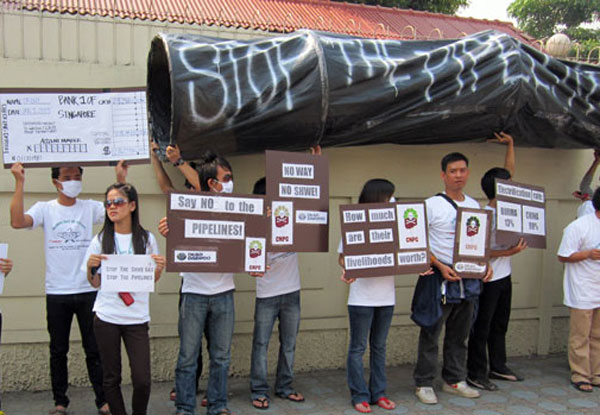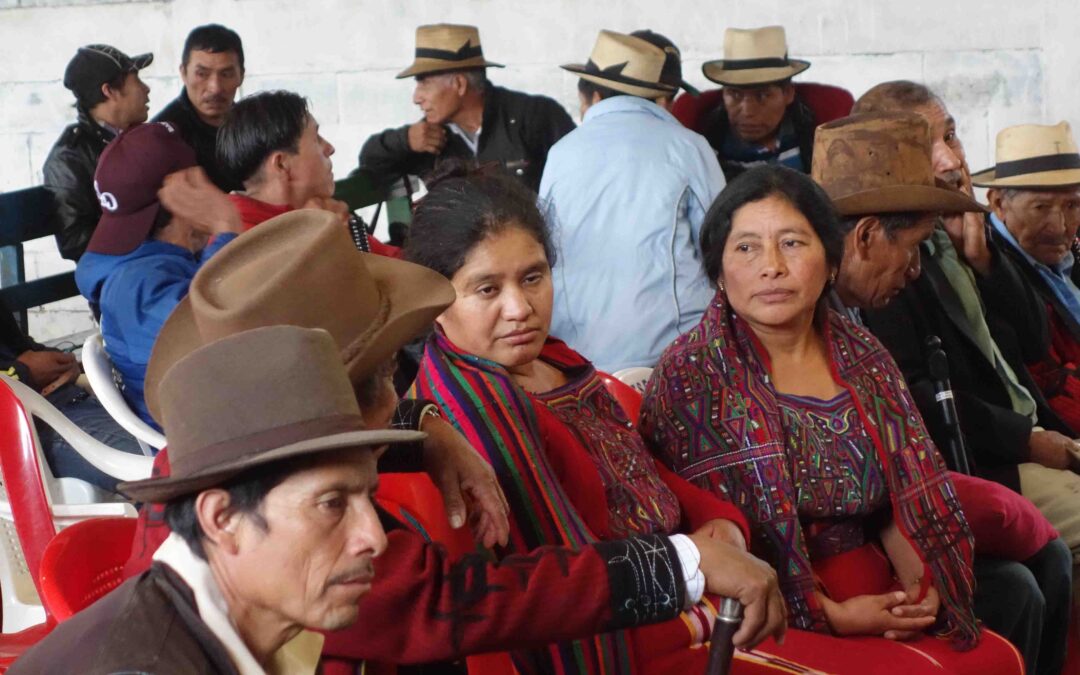
Oct 20, 2016 | Advocacy, Analysis briefs, News
In a paper published today, the ICJ recommends a series of substantive elements that it considers as key to an effective treaty on business and human rights.
The ICJ is publishing this paper as the second session of the open ended intergovernmental working group on transnational corporations and other business enterprises with respect to human rights (OEIWG) will be held next week (24-28 October).
On 26 June 2014, the United Nations Human Rights Council (HRC) adopted Resolution 26/9 establishing an “open ended intergovernmental working group on transnational corporations and other business enterprises with respect to human rights” (OEIWG) with the mandate to “elaborate an international legally binding instrument to regulate, in international human rights law, the activities of transnational corporations and other business enterprises”.
The first session of the OEIWG took place from 6 to 10 July 2015.
The ICJ supports the objective of establishing an international legally binding instrument on transnational corporations and other business enterprises, with a focus on business accountability and access to effective remedies for human rights abuses by business enterprises.
There is a substantial international protection gap to be filled in this respect, on which the ICJ has previously commented extensively.
It is with a view to closing this gap and ensuring that international human rights law can optimally fulfil its protective function that the ICJ is engaging in the present treaty process.
The key elements in the ICJ paper are a contribution to the ongoing discussions about the future instrument, without being exhaustive as to such elements.
The ICJ has already published a paper focused on issues of scope of businesses to be addressed in the treaty, in particular the meaning or “transnational corporations (TNCs) and other business enterprises” a question which remains unresolved and is contentious in the OEIWG discussions.
The present paper will focus on the possible content of the prospective treaty.
universal-oewg-session-2-icj-submission-advocacy-analysis-brief-2016-eng (full text in PDF)

Sep 18, 2016 | News
The ICJ held a workshop on Environmental Impact Assessment in Kyauk Phyu on 17-18 September 2016. Thirteen women and 30 men attended from Kyauk Phyu town, its surrounding villages and the regional capital Sittwe.
Kyauk Phyu is the proposed site for a megaproject to include a Special Economic Zone and deep seaport in Myanmar’s westernmost Rakhine State.
A Chinese company plans to develop the projects and the newly elected Myanmar Government is considering its future.
The EIA workshop included lawyers and civil society representatives as well as village administrators from each of the nine village administrative tracts in the proposed SEZ area.
An EIA is designed to avoid, minimize, eliminate and reduce harmful impacts of development projects.
It can require revising plans, making alternative arrangements and even cancelling project components.
Myanmar law now requires EIAs, including in SEZs, under the 2014 SEZ Law and 2015 EIA Procedure. Health, livelihood and social impact assessments are critical to this process.
Projects may only commence after the Environment Ministry approves an EIA.
Sean Bain, ICJ Legal Consultant for Myanmar, shared updates from research on SEZ legal frameworks and project plans.
The ICJ’s Legal Researcher, U Hayman Oo, facilitated discussions and linked these laws with local developments.
Participants were encouraged to document their land and livelihoods so they may have an evidence base to refer to in future.
Matthew Baird, an environmental lawyer supporting both the Environment Ministry and civil society groups, outlined each step involved in an EIA.
He emphasized the importance of public participation throughout the process – particularly in the early screening and scoping stages.
Early community engagement is critical to influence the focus and scope of the investigation, which would inform the draft EIA Report developed by an EIA consultancy firm.
Daw Khin Su Su Naing, from Coffey, explained the role of the consultancy firms hired by companies to conduct EIAs.
She described how social impacts are assessed, providing examples from elsewhere in Myanmar. Public participation was again emphasised as crucial.
U Mya Hlaing, from the Thilawa Social Development Group, shared community experiences from the development of Myanmar’s only active SEZ – located in Thilawa, across the river from Yangon. Villagers resettled by the project remain concerned about the standard of relocation sites and loss of livelihood opportunities.
Community organizing in Thilawa has been an important factor in improving public participation in EIA and resettlement processes.
Dr Daniel Aguirre, the ICJ’s International Legal Adviser, discussed international business and human rights frameworks, and the monitoring role of civil society.
From Earth Rights International, U Zaw Zaw explained how an Operational Grievance Mechanism can be a useful tool for creating a communication channel between affected people and companies.
An OGM cannot solve all problems, but can help to discuss issues and remedies as they arise.
Many participants have experienced impacts from irresponsible and at times illegal business activities.
Kyauk Phyu hosts oil and gas facilities that serve a pipeline, finished in 2013, linking the Bay of Bengal with western China. No public EIA was conducted, and locals say the pipeline project led to land loss, deteriorating livelihoods and environmental pollution.
Many are still owed compensation and some were imprisoned for protesting to demand remedies.
Workshop participants expressed concerns that these problems will be repeated.
U Mya Hlaing encouraged locals in Kyauk Phyu to review the legal procedures and understand government obligations: “I am just a poorly educated farmer, but I have carefully read the laws and it has helped our community to demand our rights.”
He encouraged participants to raise concerns with Myanmar’s new governance bodies for SEZ management.
This was the ICJ’s third event in Kyauk Phyu over two years, with further initiatives planned.

Feb 13, 2016 | Multimedia items, News, Video clips
The land of several communities from the Municipality of Nebaj was sold to the State during the civil war. But this happened without any valid legal basis.
The expropriation occurred in 1984 in the area of Tzalbal, at a time when most of the people from 14 local communities had flown to Mexico or the neighboring forests because of the war, which was particularly intense in the area.
The loss of farmland affected some 15000 people.
In 2013, the communities asked the ICJ to help them recover their land.
An initial investigation by the ICJ confirmed that the mayor at that time (1984) had signed a document transferring the land into the State’s hand.
However, this happened without consulting the communities and none of their representatives signed the document.
The ICJ asked the State to return the land to the communities through a Governmental Agreement, which was initially accepted.
However, the Government eventually reneged on its promise and ended the negotiations.
The ICJ is now preparing an action for protection of constitutional rights to help the communities recover their land through a judicial decision.
Guatemala-Caso Nebaj-News-Web Story-2016-SPA (full story in PDF, Spanish)
The Nebaj case in video (Spanish, English subtitles)

Jul 7, 2015 | Advocacy
The ICJ and 15 other NGOs participating in the first session of the OEIWG to elaborate a treaty on business and human rights highlighted that in principle all conduct by all types of business enterprises, whether local or transnational, shall be addressed in the legally binding instrument.
The footnote in the preamble should not be interpreted as limiting in any way the scope of possible discussions in the Open Ended Intergovernmental Working Group (OEIWG) or any analysis or recommendations that may be reported back to the Council on a future treaty.
Business enterprises that do not have any or any significant transnational operations no doubt are capable of and in many instances have been responsible for human rights abuses no less serious in scale or severity than those of transnational businesses.
The people whose human rights are abused directly or indirectly by businesses are unlikely to distinguish whether the business enterprise that causes them harm has transnational ownership or operations; nor are affected people likely to excuse abuses they suffer from a “local” business simply because the entity lacks a transnational element.
From the point of view of those whose human rights are affected by business activities, the key consideration is not the formal character of the business entity, but instead the their practical access to effective remedy and reparation for the harm they have suffered.
If a treaty is going to take the view and needs of those adversely affected by business activity as a central concern, it must address all business enterprises that can potentially carry out abuses and not only on those with transnational links.
The statement can be downloaded here: Joint Oral Statement on Scope v.2

May 30, 2015 | Advocacy, Legal submissions
This paper was prepared by the ICJ for the first session of the Open Ended Intergovernmental working Group on a Legally Binding Instrument on TNCs and other business enterprises, argues that all conduct by all types of business enterprises, whether local or transnational, should be addressed in the legally binding instrument.
The paper argues that business enterprises that do not have any or any significant transnational operations no doubt are capable of and in many instances have been responsible for human rights abuses no less serious in scale or severity than those of transnational businesses. The victims of human rights abuses committed directly or indirectly by businesses are unlikely to distinguish whether the business enterprise that causes them harm has transnational ownership or operations; nor are victims likely to excuse abuses they suffer from a “local” business simply because the entity lacks a transnational element.
Therefore, in principle all conduct by all types of business enterprises, whether local or transnational, shall be addressed in the legally Binding instrument. The footnote in the preamble should not be interpreted as limiting in any way the scope of possible discussions in the Intergovernmental Working Group or any analysis or recommendations that may be reported back to the Council on a future treaty.
Global-Report-ScopeBusinessTreaty-2015









